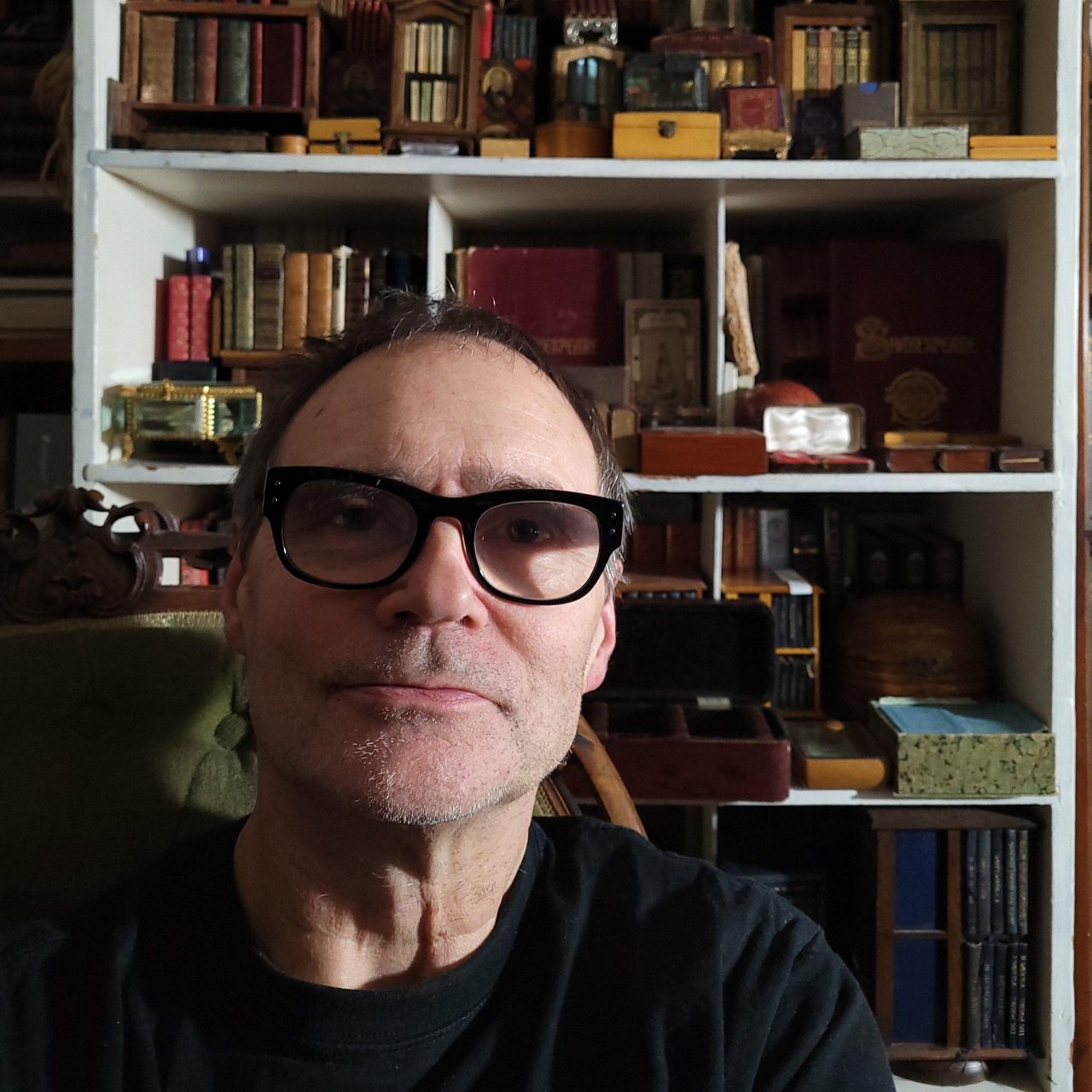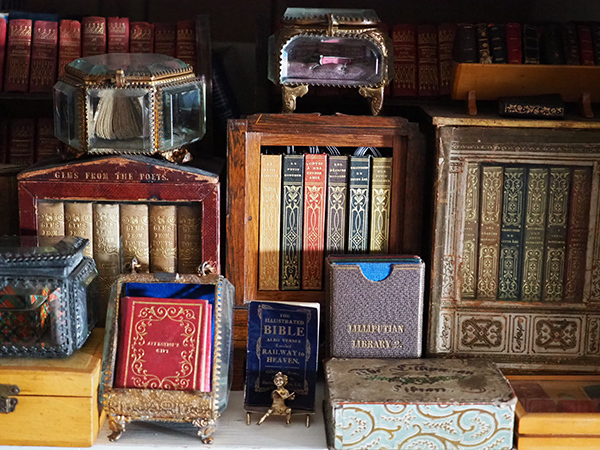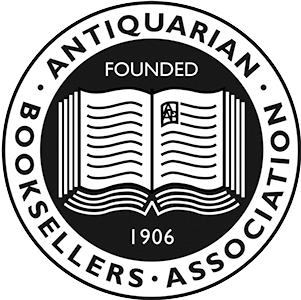ABA News
Meet Our New Members: Jason Burley, Camden Lock Books

Welcome to the ABA! Can you introduce us to your business in a nutshell?
Miniature books are my primary focus and I currently have around a thousand examples of either sets or individual miniature volumes for sale. Most of them are at least one hundred years old and have been catalogued, but are awaiting photographs and enhanced descriptions before I manage to promote them on Instagram, and at the ABA alongside other online marketing platforms. Among the rare and desirable items on offer are miniature libraries, fine microscopic printings and beautifully bound miniature volumes. I also retain a small and eclectic stock of larger collectable books that cover a broad cross-section of subject matter from antiquarian books to modern first editions. My debut ABA book fair will be in May at Firsts London.
What was your route into the book trade?
On July 9th 1979 my first and only book-trade job was at Francis Edwards of 83 Marylebone High Street as a Trainee Bookdealer on a salary of £3,000 a year! When the business was subsequently bought from Alan Mitchell by Pharos Books in 1982 and the shop became briefly known as Read’s, I was amongst those bookdealers sadly made redundant. After serving my time as a self-employed West-End book runner (also selling my stock of mainly travel books from my stall every Saturday at an indoor antique market at Portobello Road), I opened my first second-hand book shop premises forty years ago in 1984, above the old music venue 'Dingwalls' in Camden Lock on a shoestring with bootstrap funding. In inner London, ever since that date and over the ensuing forty years, I have had four book shop premises in Camden, one in Southwark, one in Islington and now Burley Fisher Books at 400 Kingsland Road, Haggerston, Hackney (cofounded with Sam Fisher) selling old books (since 2002, I also retailed new books). Burley Fisher was awarded the accolade of the Best London Independent Bookshop both in 2021 and 2022 by the Booksellers Association.
If you had to choose just one, what would you say your key specialism is, and what drew you to it?
I specialise in miniature books with a maximum dimension of less than ten centimetres or four inches. Louis Bondy's book shop in Bloomsbury at 16 Little Russell Street was my very first encounter with miniature books and I remember feeling daunted by their arcane nature. Shortly after that visit, I successfully bid for my first Ellen Terry set of miniature Shakespeare in their original revolving bookcase. Thankfully, when my regular stand at the monthly two-day PBFA Hotel Russell London Book fair happened to be right next to Michael Garbett's stand, he swiftly further demystified bijou books, and I became inspired to build up a fledgling miniature book trade from small cabinets in my bookshops. Miniature books demand less display space for collectors but hold even more fascination for just being so tiny and such extraordinary technical accomplishments; they are so much lighter and smaller to handle, pack up, post, receive through letter-boxes and transport to and from book fairs too.

Are you a collector yourself, and if so, what do you collect?
I am not a proper collector myself — every book will have its price. But I do currently keep hold of a selection of first editions of my favourite modern writers — Virginia Woolf, Louis-Ferdinand Celine (loving his novels and loathing his antisemitism), Paul Bowles, Ben Traven and Samuel Beckett. Neither do I seem to ever sell any of the dozens of autobiographical books about the book-trade written by booksellers. The hoard of modern fiction, that I optimistically hoped to re-read one day, is now gradually being thinned out, with a fair degree of reluctance. I do vigorously collect books up, but, paradoxically, I am not a collector.
Do you have a favourite item currently in stock?
There is a trap that I fall headlong into: my most recently purchased book is my favourite item in stock. I wonder if that is a weakness of character I need to keep to myself? Earlier today, I unpackaged a partset of eleven miniature Ellen Terry editions of Shakespeare published in Glasgow by David Bryce; they are all bound in red silk with faded gilt spines and, of all the multiple binding variations that exist, I have never seen a single example of this silk binding (and they are not referred to in Michael Garbett's bibliographical guide to the miniature books of David Bryce); an extremely academic point of interest, admittedly (but I am intrigued by them). Even more recently purchased is a French miniature almanac and notebook published by Le Fuel. It is a flamboyantly elaborate binding and was almost certainly retailed in Paris at the Palais-Royal, beautifully crafted in Mother-of-Pearl & ormolu gilt bronze, with "Souvenir" engraved on front panel. Lined with cream silk endpapers and dated 1820 - the year Louis XVIII was King of France, Napoleon Bonaparte was in exile on St. Helena, and there was a plot to overthrow the Bourbon monarchy. I recently sold a similar miniature book that was originally bought by a Lady-in-waiting to Caroline of Brunswick, Princess of Wales – expensive and luxurious gems of books even two hundred years ago.
Encouraging new blood in the trade is important, but it’s a tough time to set up a business. What would be your advice for people who want to begin dealing rare books?
My bookshop business partner and five staff are all about ten years younger than my oldest child but I have quietly encouraged them to embrace and engage with the book trade by passing on some key principles and by urging them to delve into what catalogues and reference books are available online, at book fairs and in the books brought in by customers for sale. They have had some very successful book house clearances. My initial advice, for what it may be worth, is to become familiar with one or more book dealers, talking to them and to their staff; then I recommend regularly scouring and researching the internet on a relatively narrow range of rare books; a bit of book-running would be a tentative first step into selling books and gauging what is in demand. Most of the people I have met who went into the book trade are entrepreneurs and have a dogged determination and passion for what they do. I enjoy and feel flattered to be asked to counsel anyone who hopes to join the book trade but doubt my time or advice is specifically of value other than providing encouragement and setting an example of sorts. If I can do it, why not you?
Find out more about Camden Lock Books.
